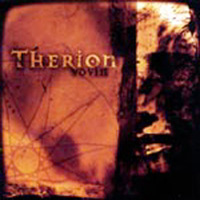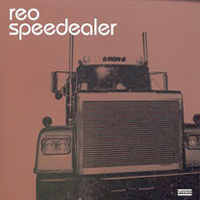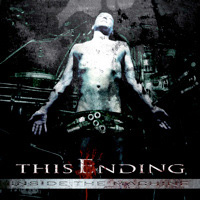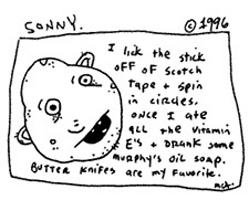 Therion
Therion
Vovin (Nuclear Blast)
An Interview with guitarist/composer Christofer Johnsson
by Scott Hefflon
Mixing metal and classical the way you do, what’s your musical education?
I’ve never taken a music lesson in my life. Not for guitar or any other musical instrument. It was a bit of a problem when I began composing classical things, because they only play real notes. I’m used to playing metal, the rock’n’roll way, which is watching people’s fingers and listening. I started with bass, actually, because it was easier and there were no chords. I played in a band and they told me “Put your fingers there, there, and there, and play it so it sounds like this.” A few months later I was so bored with that I started my own band. Being a composer is what gave me the energy to play. Even though I couldn’t play the bass, I had loads of musical ideas I wanted to play. I was motivated to learn quite fast. After a year, I switched to guitar.
Were you playing death metal at the time?
When I played bass, we played more old Metallica, Venom, Mordred, Slayer, very noisy metal with overdrive on the bass, kind of like Motörhead. When I began doing classical, we started with the keyboards which I played myself, and when it came to the two opera soloists, they were quite flexible because they were young and familiar with rock’n’roll. I just played the harmonies on keyboard and they memorized it. It wasn’t that much. When I did Theli, which had massive choir arrangements throughout the album, I realized I had to learn to read and write notes. I mean, I knew how notes worked, and I knew how to write a form of guitar tabulature I invented myself with symbols and so forth, but when it came to writing down my own songs for other vocal ranges and instruments, it was hell. Like, what range does a soprano sing, and which does an alto, tenor, baritone, and bass sing? It was very confusing at the beginning. I heard this music in my head, but I had to learn the technical information to show others how to fulfill my musical vision.
Did you find it frustrating to get bogged down in the technical when what you enjoyed was the creative?
No, I learned it quite fast because I had to. I’d played everything on keys, so I went into the studio with everything on MIDI files. We printed the notes in the studio, and the producer then made corrections. Like a violin is quite different from a guitar. To me it was just a stringed instrument, but there are things that are quite simple to play on guitar that are very inconvenient, or impossible, to play on violin because they’re tuned differently. And vice versa. It was good for me doing it this way, and I learned very fast. It was very useful when I later did the soundtrack for a movie, and even then I learned more. When I began doing Vovin, things ran more smoothly, with very few problems, and I learned even more.
Working with various instruments, you must get the feeling for the character of each: what its strengths are, what its weaknesses are, what subtleties and nuances can be brought out by the nature of the instrument, much less the style and inflection of the performer.
When I did Theli, it was more rock harmonies sung by an opera choir, and I arranged it so that it was suited for a rock choir. It was interesting because I’d never heard anything like it. But later, I found out that this was not the way opera singers usually sing. On Vovin, they sing more traditionally, the way they usually treat their voices, but on top of rock music. So it was very interesting for me to explore different styles and see how they work. Say in rock music, when you have a melody and want to add a harmony, you usually add a higher one. With either a vocal or a guitar riff, that’s usually the way it’s done. But with opera, it’s much more common to add an underlying harmony. It affects the melody in a different way. It supports it and makes it bigger, instead of drawing from it.
 Vovin has only one traditional metal song, whereas Theli seemed to have more.
Vovin has only one traditional metal song, whereas Theli seemed to have more.
There are actually two metal songs on Vovin: “The Wild Hunt” has a chorus sung by a metal singer, but “Wine of Aluqah” has ’80s heavy metal riffs as well.
Theli had more upbeat, galloping drums, more aggression. Vovin is more subtle, almost ethereal.
Theli‘s production was noisier, while Vovin is cleaner. There are so many small details… I put up to eight guitar tracks in a song. Also, if you have opera singing and music, you want to be able to hear both. There are a lot more clean guitars on this album, more mid-tempos, more melancholic harmonies. It’s quite sad, I think. Theli had more singable, catchy melodies, but I thought it was too “hitty.” I guess for Vovin I subconsciously went into deeper things. The focus isn’t on the vocal lines, it’s on the whole thing. It takes a while to get into it, but I think ten years from now, people will still enjoy Vovin.
What was going on in your life, what were you thinking about, when writing this record that may’ve led you in this more compositional, less instantly catchy direction?
Theli was written over the course of several years. When I wrote songs that didn’t fit Therion at the time, I saved them for myself. When I finally had the budget, I gathered them together, rearranged a few of them, recorded some new songs, and that was Theli. Vovin was all written since Theli. Funny enough, writing Vovin has been one of the most stressed times of my life, yet I wrote laid back music. Perhaps this was a way of ventilating the brain.
How long does it take to put something like this together?
It’s impossible to tell how long it took to write Theli because it was here and there over a matter of years. I think we were in the studio for about a month and a half recording it. Vovin was written all at the same time, with the exception of “Raven of Dispersion” which I found on an old tape. I must’ve forgotten that one. I think I wrote it quite soon after Theli. The rest was written in about a month.
You wrote all that in a month?
I write in periods. I’ll write for a couple of days, then absolutely nothing. Then a couple of days, or a week – but if you put it all together, it probably added up to a week. Then the arranging probably took a month. Then pre-production took about a month and a half, at home, recording a demo version of the album and typing all the notes, fitting the lyrics beneath the notes… That’s a helluva job – when you print the notes, they want the lyrics printed under them. When you’re working on the fuckin’ computer program I’m using, it looks all wrong, so I write the lyrics in by hand. Then there are the notes for each instrument in the orchestra, because each one only needs their lines. Then there’s the overview for the conductor, that was a fuckin’ job. The last two weeks, I worked seven days a week, 13 hours a day, it was quite exhausting. The day I was done, I traveled to the studio and worked another month and a half recording the actual album, using the demo version as a model. So there was never a band rehearsing, I used hired musicians exclusively. I sent tapes to everyone so they could practice at home. Except the drummer (Wolf Simon), he didn’t want a tape. He just showed up, listened to the demos for the first time in the studio, wrote down some notes on a piece of paper, then recorded it perfect the first time, first take. The great thing was, I’d tell him a song should sound like Ian Paice (from Deep Purple), and he’d play like Ian Paice. He’d worked for so long as a studio drummer, he can play in whatever style you want him to.
Was that the same scenario with all the hired musicians?
No, the bass player (Jan Kazda) was a jazz player who writes music himself, so I told him to follow the tape, but feel free to play around a little. Probably 99% of the bass lines he came up with were perfect. He also orchestrates rock music, so he conducted the orchestra. He did some additional arrangements in places he thought could use a facelift, and it was very interesting for me to have someone else add a harmony to one of my melody lines. Normally, I do things the way I want, and whatever I write is what we record. It’s interesting to work with someone else, and perhaps in the future I’ll compose in collaboration with someone else. That’s something I’ve never done before.
Did the singers bring any ideas to the table?
No, they’re like machines. Opera singers sing what’s on the paper. That’s one thing I noticed, and one reason why I never took lessons. When I meet people who’ve taken lessons, they think like their teacher. They don’t think about what it could be, they think about the way it is. I had a girlfriend who played classical guitar, and I asked her to play me something she wrote. She said, “Wrote?” She’d never written a scrap of melody or even put two tunes together. They play the notes. It’s a different way, and while I respect that because they are very good, it’s not my way.
What instruments do you play on the records?
I play about 75% of the guitars and all the keyboards. That’s enough. I stopped singing, and this record doesn’t have much keyboard. It’s mostly orchestra. Actually, the Hammond organ was played by another guy (Lorentz Aspen).
Do you think there’ll come a day when you don’t play any of the instruments?
I wouldn’t mind that. I could be like the Alan Parsons Project. I could just write songs. The thing is, it’s such a hassle to get someone to play easy riffing guitar the way you want it. It’s easier to do it myself. It’s pointless to transcribe the notes, because then you have to explain the feeling you want them to have. It takes only five minutes to do it myself.
Interesting that rock guitar is the one instrument that’s troublesome describing on paper.
The classical stuff is pretty straightforward, there are very good signs describing exactly what you want. In rock guitar, you either have to tell someone to play it like so-and-so, and then you’re just copying someone else, or you have to show them. And if you can show them yourself, you might as well play it yourself. Most of the guitar on Vovin is exceedingly simple, but I used three other guitarists to get a special feeling I wanted that I wasn’t able to get myself. Like the producer, Sigfried Bemm, did some of the clean guitars because he has a really groovy way of playing. He usually only plays acoustic, and he plays with his fingers, so when he plays an electric guitar, it’s a much different sound than when I play. I play crystal clear, but I wanted some parts to be a little more dirty. When it came to a part I wanted almost sterile it was so perfect, I asked Waldemar (Sorychta, Grip Inc. guitarist, producer extraordinaire). And Tommy Eriksson plays the solos I composed. I play very warmly, he plays stone-cold, very… how can I put it in English, there’s the perfect Swedish word for it… like a starving cat or something, very miserable, really sad and forlorn.
You have various other members of bands, and entrust your lyric-writing to someone else.
Thomas (Karlsson) isn’t in a band, but he’s one of my very best friends, and he’s written lyrics before for me. I can’t write lyrics under pressure, and he writes the same kind of lyrics as me, only better, I think, so I asked him to do the lyrics. I gave him the demo version, and made a few suggestions as to what I wanted the songs to be about, and he did it. When they didn’t fit perfectly, we usually changed the words, but once or twice we added a note to fit the lyrics.
Do the words mean much to you, or is it mostly about the music?
The words mean a lot. That’s why I didn’t want to write a bunch of shit myself. I can honestly say the lyrics are very personal to me, even though he wrote them. We’re very good friends and we have the same sources of inspiration and knowledge in these matters.
“In these matters,” that’s good. How would you best summarize your shared inspiration and knowledge?
Well, I’ve been practicing magik for seven years and he’s been doing it for about fifteen. He has a personal library with all his esoteric books, and I’d guess he has over 1,500 books. We both are involved in an order called Dragon Rouge, a traditional Magikal order. In the earlier days, I think the lyrics were more philosophical, later, they turned more ceremonial and ritualistic, with invocations. Later, they become more personal, like astral projection revelations or lucid dreaming… I don’t know the English words for many of these terms.
Many people bring about such states with the aide of hallucinogenic drugs. Do you?
I’ve tried them, but years ago. They can work for people in the arts, but I think their effects are a short-term thing. Most artists who continue to use them, rely on them, and then their work begins to suck pretty badly. I think life is so psychedelic in itself that I don’t need drugs. I’ve tried most, but they aren’t really my thing. I proved to myself I could handle them, but it’s nothing I feel I need for my life’s work. I’m even very careful with my alcohol. I’m kind of a snob, actually. I like to drink really good cognac, good single malt whisky, or fine red wine, and drink just a little instead of drinking my head off with cheap beer. When we’re on the road, I drink a few beers a day, just to help me sleep on the bus. It’s quite hard to sleep on a moving bus, so I consider them a healthier version of sleeping pills. I can’t remember the last time I got really drunk.
Do you read much, aside from magik books?
I don’t really have the time to get deep into it. I touch on philosophy, but when I get the time, I read magikal books. I haven’t read a novel in years.
What are your thoughts on black metal?
For me, black metal was something of the mid-’80s. Bands like Hellhammer, Bathory, and Venom. I listened to them at that time, and I still think those bands are good even though I don’t listen to them every day. I grew up on typical ’80s heavy metal bands like Iron Maiden, Judas Priest, Saxon, and Manowar, but when I buy an album now, it’s probably from the ’70s. Bands like Kansas or the Scorpions. Most of the bands that were great in the ’70s sucked in the ’80s. Except Judas Priest, they were always good. I really like the first three albums when they were doing hard rock epics.
What about the new wave of black metal that’s often symphonic and sweepingly melodic?
It’s too noisy for me. Covenant, Dimmu Borgir, and Cradle of Filth are better than the rest, but I don’t listen to them. I can listen to it and tell it’s good stuff, but it’s not my cup of tea. The aggressive music reminds me of when I was a teenager, and had to get rid of the aggression somehow. I listened to a lot of death metal at the time, and there were a few really good bands, but I just don’t feel like listening to it anymore. I listen to it more with my ears than with my heart, you know? Sometimes when you feel like listening to something brutal and you have this new album, it doesn’t matter if it’s very good. It still has a function, even though it’s energy ventilation as opposed to good music.
Do you listen to a lot of classical music?
I do now, but when I started, it was based on hard rock bands from the ’70s playing with symphonic backgrounds. I had a few albums by Beethoven, Mozart’s “Requiem,” and maybe one album by Stravinski, but as people asked me about it, I became more curious. In the last year, I’ve become a really into classical and opera. I’m a big fan of Mahler, Wagner’s operas, and Brahms.
Do you listen to any new classical music?
I don’t listen to anyone living today, but I just haven’t heard anything contemporary. Maybe I should check it out.
What about movie scores and musicals? I’m thinking Andrew Lloyd Webber and Danny Elfman…
I like The Omen, that’s good, and Andrew Lloyd Webber and another guy did Jesus Christ Superstar…
OK, it was a stretch…
Actually, I think the ABBA composers, Björn and Benny were fuckin’ brilliant. The composition of the songs is amazing. They also did a musical that was excellent. If you get The Album, you get excerpts from it. I have all their albums. You should check out Ring, Ring, their first record, before they became famous. It’s Beatles-influenced as is quite interesting. There are some heavy guitars on it too. It shows a very different side of them, before they became poppy, but even their poppy stuff I think is genius. You can write intelligent pop and you can write foppish pop, but their pop is more than intelligent, it’s genius.
(PO Box 43618 Philadelphia, PA 19106)



